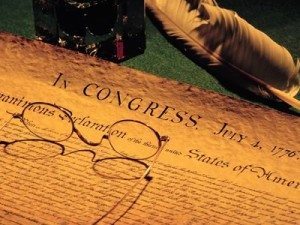 “At the heart of every success story is a peson whose passion…has driven them to reach out in some extraordinary way to their fellow man and make a true difference.”
“At the heart of every success story is a peson whose passion…has driven them to reach out in some extraordinary way to their fellow man and make a true difference.”
Quint Struder
When the founding fathers of this nation penned the document which guided our country for almost two-hundred and fifty years, the Declaration of Independence, its framework was built around three simple, profoundly powerful principles: the value of life; the significance of liberty, and the opportunity to pursue happiness.
This straightforward, yet radical declaration has served as a source of inspiration for citizens everywhere since the day it was signed. But the sad truth is, our society has strayed so far from many of the ideals in the Declaration of Independence that it’s no wonder our people struggle to find common ground from which to build a shared path to a better tomorrow. Today we are far more divided than united; seemingly more interested in pursuing self-interest than in serving the greater good.
By design, the Declaration of Independence leaves the definition of “life” open to interpretation. Unfortunately, many people today seem content to interpret this simply as “quality of life” meaning, life is good if we look good, feel good, or possess plenty of goods. Similarly, liberty, the very principle which distinguishes democracy from others forms of government and provides us our true measure of freedom as individuals and as a nation, has also been distorted beyond recognition. Much like the pursuit of a particular quality of life, many today choose to liberally translate liberty as the ability to do anything one may desire–regardless of the cost or consequences of these choices on the community, society, or planet we must all share.
But perhaps the greatest misinterpretation of all relates to our culture’s hijacked definition of happiness. Far from the ideal intended by our nation’s founders, who spoke merely of happiness as a characteristic of a good life, that is, a life in which a person fulfills human nature in an excellent way, many people today choose to interpret happiness narrowly— measuring it more by what we can get for ourselves than what we can give of ourselves when serving a purpose greater than ourselves.
Much like Seymour the Seagull and his flock of self-oriented seagull friends in Disney’s, Finding Nemo, who fly about repeating their favorite phrase, “Mine, Mine, Mine,” our society is quick to accept a hedonistic orientation that encourages us to interpret happiness through the lens of “Me, Me, Me.” To many of us, happiness means no more than the pursuit of wealth and status as embodied in such things as where we live, what we drive, how we look, what we wear, and how much we can accumulate for ourselves. Sadly, none of this is even close to what the citizen leaders who founded our nation had in mind at our country’s inception when they spoke of our fundamental rights as American citizens.
So what did the framers of our Declaration of Independence really mean when they implored us to pursue and protect at all costs our fundamental rights to life, liberty and, in particular, the pursuit of happiness? Interestingly, they were not promoting doing whatever’s best for ourselves, individually, but challenging us to live our lives for a higher purpose, collectively. Invoking the Greek idea of eudemonia, they were challenging us to pursue a deeper source of satisfaction by living well and doing well.
Properly understood then, our founding fathers were telling us not to promote our own interest, but rather, were challenging us to exercise personal responsibility to contribute to the kind of society we each desire and deserve. Not by accepting mediocrity as the norm or remaining prisoners to the status quo. But by risking being different for the purpose of making a positive difference in our surroundings—one opportunity at a time.
Let’s take our Founding Fathers’ wise advice and each commit to doing something in our own spheres of influence to promote the positive change we so desperately yearn to see? Who knows, we might just inspire some modern day politicians to follow our example.
